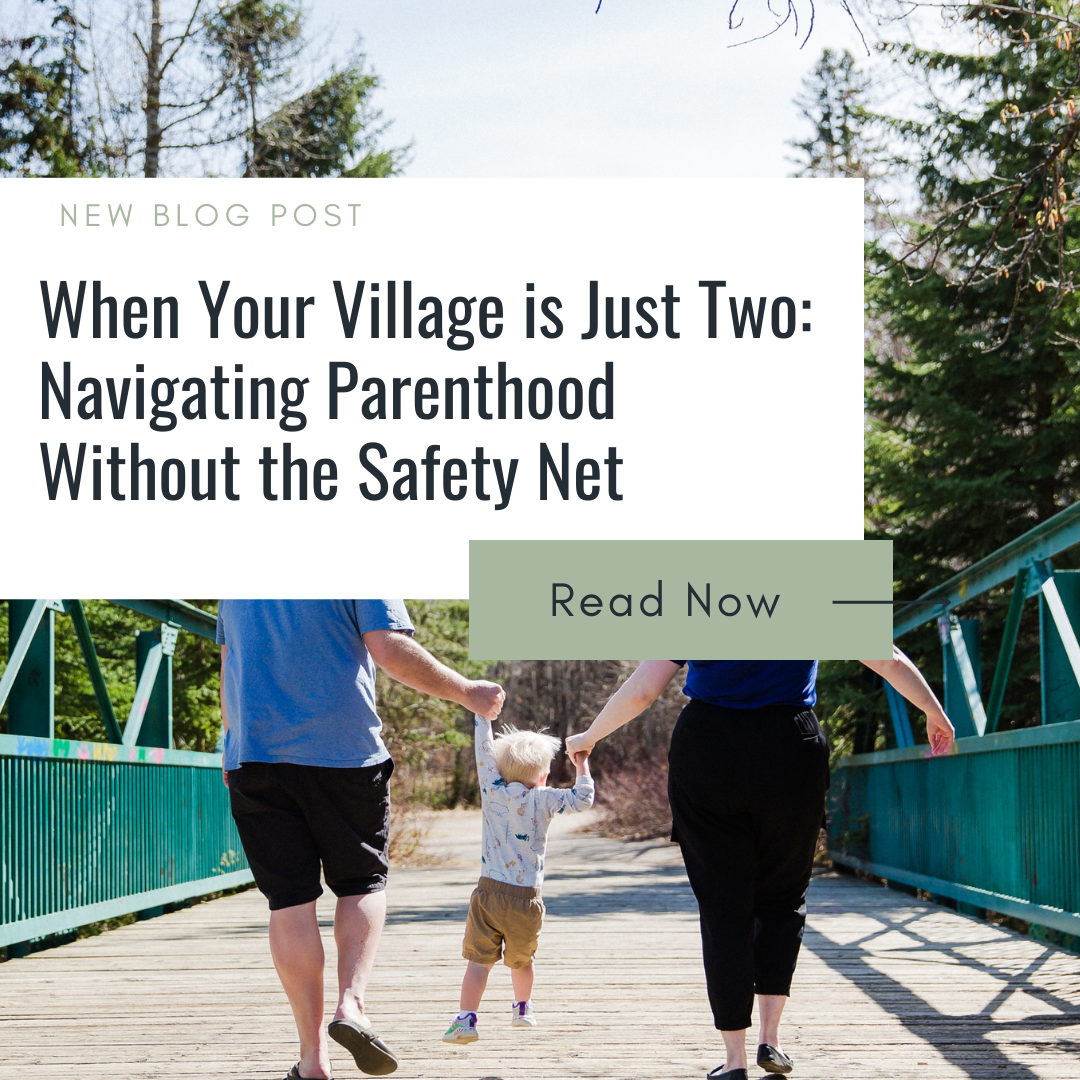It takes a village to raise a child. We’ve all heard it a million times. But what happens when your village is basically just you and your partner, standing in an empty field, wondering where everyone went?
I’m sitting here on a Tuesday morning, my 4-year-old asking for his third snack while my 1-year-old empties every drawer he can reach, and I’m struck by how much I lean on my husband for childcare. Not because he’s doing me some enormous favor, but because literally, who else is there?
It’s a weird time to be alive, honestly. Our generation of parents is navigating something that feels both familiar and completely foreign. We’re raising kids in an era where extended family might live across the country, where community feels more digital than physical, and where the traditional support systems our own parents relied on have largely evaporated.

The Math of Modern Parenting
Let me paint you a picture of our “village”: Between my husband and me, we have exactly three living parents. My father-in-law lost his battle with cancer in 2018. My mom and I are estranged – one of those complicated family situations that sounds simple from the outside but feels impossibly tangled from within. My dad was in a serious car accident over a year ago and still isn’t healed enough to safely care for two young children by himself.
That leaves my mother-in-law, who is honestly our biggest helper. She takes my eldest three afternoons a week so I can work, which is a gift I don’t take lightly. But here’s the thing – she’s fairly young and leads her own busy life. The guilt of asking for more help, even when we desperately need it, feels overwhelming. There’s this invisible line between “grateful for help” and “taking advantage,” and I’m constantly worried about crossing it.
So when I want to go grocery shopping alone, just me, my list, and the radical freedom to actually read ingredient labels – that means finding childcare. When I need a Saturday morning to myself, or when my friends invite me away for a weekend, it all falls on my husband. And thankfully, it’s 2025 and I have yet to hear him say no. But the weight of that reality sits heavy sometimes.
The Babysitter Question
I know what you’re thinking: “What about a babysitter?” Trust me, I’ve thought about it. With my youngest, I’m getting there. I’m just not quite there yet. Maybe it’s the lingering effects of raising babies during a global pandemic. Maybe it’s the particular attachment that comes with a one-year-old who still feels so small and vulnerable.
Whatever it is, I’m not ready. And I’m trying to give myself permission to not be ready without feeling like I’m failing at modern motherhood. There’s this unspoken pressure that if you’re not comfortable leaving your kids with various caregivers, you’re somehow behind, or overprotective, or not properly fostering independence. But sometimes, not being ready is just not being ready.
Redefining Self-Care When Resources Are Slim
Here’s what I’ve learned about self-care when your village is small: it has to be creative, intentional, and often microscopic. It’s not always going to look like the Instagram version with the face masks and the wine glasses and the girls’ trips (though sometimes it might, and that’s beautiful too).
My biggest recommendation for couples navigating this reality? Set intentional boundaries around downtime. In our house, we’ve started alternating afternoons where one person takes both kids and the other gets genuine time off. Not time to do laundry or catch up on work emails, but actual downtime. Sometimes that means I’m lying on my bed scrolling TikTok while he manages snack requests and potty breaks. Sometimes it means he’s playing video games while I wrangle two small humans through a nature walk.
The key is making it explicit and reciprocal. It’s not me asking for a favor when I need space; it’s us both acknowledging that parenting is intense and we each deserve regular breaks from it.
Self-care, when resources are tight and help is scarce, can be beautifully small:
The coffee deck moment. Five minutes on the back deck with a hot cup of coffee, listening to birds instead of “Mommy, mommy, mommy.”
Strategic screen time. Yes, I said it. Sometimes self-care is putting on a movie for the kids so you can sit in the same room but exist in mental quiet for 90 minutes.
Meal delivery salvation. When you’re touched out and tapped out and the thought of making another meal feels insurmountable, ordering dinner isn’t giving up. It’s survival.
The car pickup line meditation. Those 15 minutes waiting to collect your preschooler, windows down, music on, no one asking you for anything.
Bathroom breaks that last longer than necessary. We all do it. We all need it. No shame.
The Invisible Load of Limited Support
What’s particularly hard about parenting with a small village is the invisible mental load it creates. Every social invitation requires logistical gymnastics. Every appointment needs childcare coordination. Every moment of personal need becomes a negotiation with your partner’s schedule and energy.
I find myself declining opportunities not because I don’t want to go, but because the effort of arranging care feels more exhausting than just staying home. There’s a particular kind of isolation that comes from being technically able to do things but practically unable to access them easily.
And then there’s the worry – what happens if both parents get sick? What’s the backup plan when the backup plan is just… each other? These thoughts don’t keep me up at night, but they hover at the edges of my consciousness, a reminder of how thin our safety net really is.
Building Micro-Communities
Since we can’t magic up extended family or transport ourselves to a time when neighbors watched each other’s kids regularly, we have to get creative about community building. Some things that have helped us:
Playdate swaps with other families where we actually take turns watching all the kids so one set of parents can have free time.
Neighborhood connections that start small – maybe just knowing which families have kids the same age, being the person who brings extra popsicles to share.
Online communities that provide emotional support and practical advice, even when physical help isn’t available.
Professional support when possible – hiring a house cleaner quarterly instead of monthly date nights, grocery pickup services, anything that buys back time and energy.
Embracing the Both/And
Here’s what I’m learning to hold simultaneously: this is hard AND we’re doing okay. The village is smaller than we’d like AND we’re creating meaningful connections where we can. Self-care looks different than we expected AND it still matters. We’re more isolated than previous generations AND we have resources they didn’t.
I’m grateful for a partner who says yes to my weekend trips and grocery store escapes. I’m grateful for a mother-in-law who makes my work possible. I’m grateful for the small moments of peace I can carve out in busy days.
But I’m also allowed to acknowledge that it’s hard. That some days the math of childcare feels impossible. That I sometimes feel guilty for needing breaks from the people I love most in the world. That building a life with a small village requires more intentionality, more creativity, and more grace than we anticipated.
To all the millennial moms reading this while kids climb on your lap or interrupt every sentence: you’re not alone in feeling like the village is smaller than promised. You’re not asking for too much when you need help. And you’re not failing if your version of self-care looks different than the magazines suggest.
We’re figuring this out as we go, creating new models of support and community and care. It’s messier than we planned, smaller than we hoped, and more beautiful than we expected.
Sometimes, a village of two is enough. And sometimes, it has to be.

The Balanced Mom

View comments
+ Leave a comment